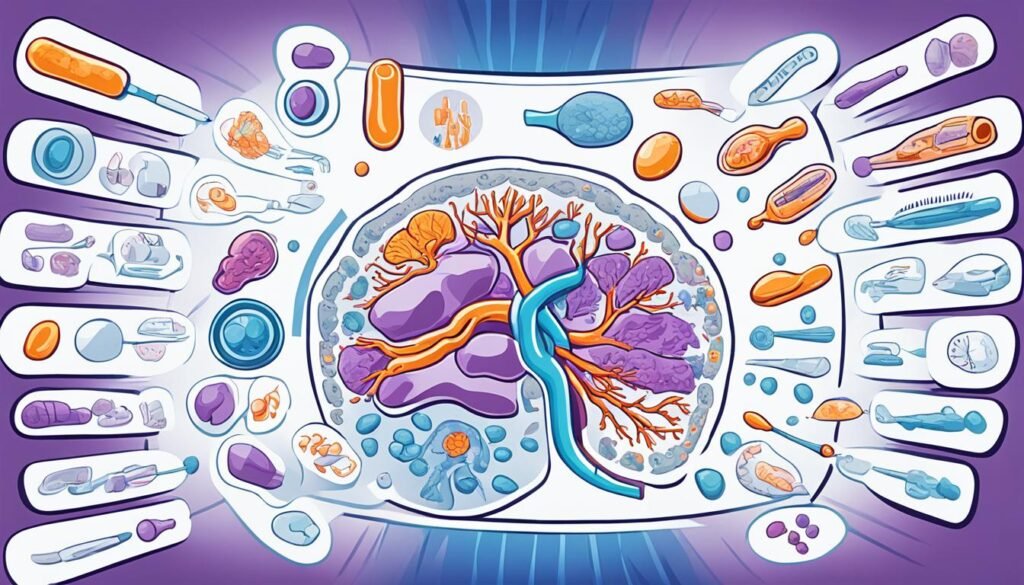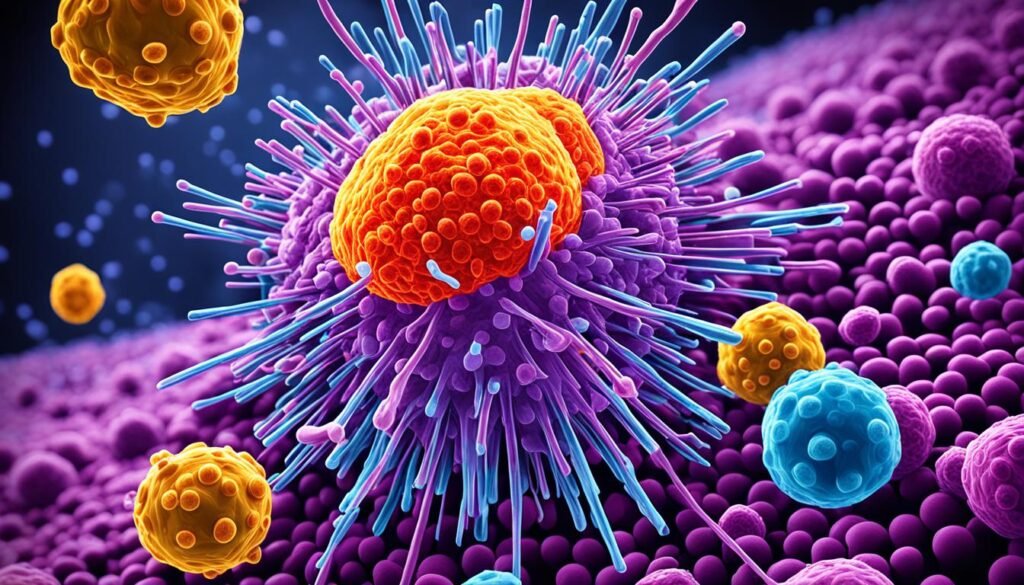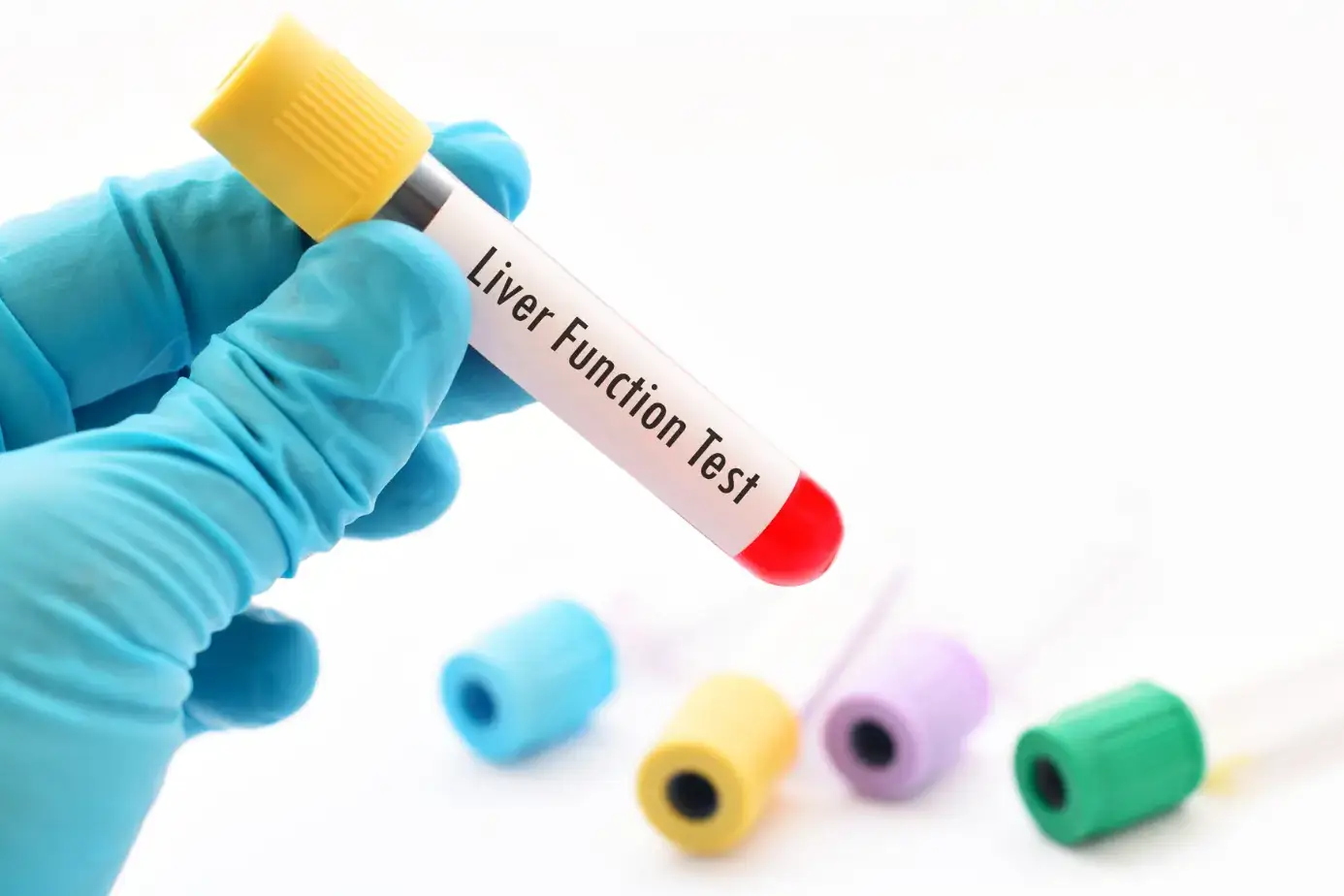If you or someone you love has pancreatic cancer, you might feel overwhelmed by all the treatment choices. But, many people have been where you are now. They’ve faced this tough disease and found their path. With the right care, you can too.
Table of Contents
ToggleIt’s crucial to gather the support you need. This could be from your doctors, support groups, or other community help. Knowing about the treatment options, including surgery and advanced treatments, empowers you. It helps you choose the best plan for your situation.
Find the right people to support you along this journey. They can guide you towards understanding the signs and causes of pancreatic cancer. Each person’s fight is different. Your best treatment plan reflects your cancer’s stage, your health, and what you want.
Know that help is always available, no matter where you are in your fight. People and groups are there to offer you information and support. Don’t be afraid to reach out. This support is vital as you heal and recover.
Understanding Pancreatic Cancer
Pancreatic cancer is rare but spreads quickly. Sadly, only about 9% of patients survive five years. It’s the fourth major cause of cancer death in the U.S. More people are getting this cancer due to aging, obesity, and harmful chemicals.
Prevalence and Incidence
Around 66,000 Americans learn they have pancreatic cancer every year. Many people, about 101,000, live with this condition. It’s usually found in those over 55, with men a bit more likely to get it.
What Causes Pancreatic Cancer?
Smoking, diabetes, and family history increase the chance of getting pancreatic cancer. If you smoke, your risk doubles. Being obese makes it about 20% more likely. But a mix of smoking, diabetes, and a bad diet is the most risky. for more information u can read What Causes Pancreatic Cancer? here.
Types of Pancreatic Cancer
Most cases start in exocrine cells, which help digest food. But there are also PNETs, tumors that grow in endocrine cells. Where the tumor is located in the pancreas affects the type of treatment and how well the patient does.
Diagnostic Approach
Early detection is key in battling pancreatic cancer. The disease often shows no specific symptoms at first. But, as it advances, you might notice signs like abdominal pain, jaundice, and weight loss.
Other symptoms may include a lack of appetite and feeling sick. It’s vital to spot these signs early and get checked by a doctor. This can improve the chances of finding the cancer sooner and starting treatment promptly.
Imaging Techniques
Imaging tests are critical for diagnosing pancreatic cancer. They provide detailed pictures of the pancreas and nearby areas. Some common tests are ultrasound, CT scans, and PET scans.
Endoscopic ultrasound is also used. It makes images of the gut and organs near the pancreas. This mix of tests helps doctors see the cancer clearly.
Biomarkers and Liquid Biopsy
Besides imaging, blood tests like the CA19-9 test can be helpful. These look for markers that might suggest cancer. Also, genetic tests can show if genetic factors make the disease more likely.

With these tests and a full check-up, doctors can catch pancreatic cancer early. This is crucial for choosing the best treatment for each patient.
Staging and Classification
It’s crucial to know the stage of pancreatic cancer for the right treatment. The TNM system helps doctors classify it. It looks at the tumor’s size, spread, lymph nodes involvement, and distant metastases.
Resectable Pancreatic Cancer
Resectable pancreatic cancer means the tumor can be fully removed with surgery. It’s mainly for stage I and selected stage II cancer. The criteria include that the tumor hasn’t spread much or involves major blood vessels.
Borderline Resectable Pancreatic Cancer
Some pancreatic tumors are harder to treat if close to major blood vessels. They’re labeled as borderline resectable. Before surgery, patients might need chemo or radiation. This extra treatment aims to help remove the tumor completely.
Locally Advanced Pancreatic Cancer
For tumors tied to blood vessels or nerves, surgery alone isn’t enough. These are called locally advanced. Treatment involves chemotherapy and radiation. Their job is to shrink the tumor, making surgery a possible option.
Surgical Treatment Options
Surgery is key for treating localized pancreatic cancer. The main surgery is the Whipple procedure. It removes the pancreas’s head, the duodenum, part of the bile duct, and sometimes the stomach.
Another surgery is distal pancreatectomy. This cuts out the pancreas’s body and tail. Or total pancreatectomy, taking out the whole pancreas.
1. Pancreaticoduodenectomy (Whipple Procedure)
The Whipple procedure is vital for cancers in the pancreas head. It takes out the tumor and tries to save healthy tissue.
2. Distal Pancreatectomy
For tumors in the pancreas body or tail, distal pancreatectomy is used. It takes out the spleen too.
3. Total Pancreatectomy
If cancer spread, a total pancreatectomy might be done. This surgery also removes parts of the stomach, small bowel, and other organs.
4. Importance of High-Volume Centers
Where you have surgery matters. Places that do many of these surgeries each year have better results. They have expert teams and resources just for pancreatic cancer.
Medical Treatment Options
For some pancreatic cancer patients, surgery isn’t an option. Or their cancer is too far along. In these cases, treatments like chemotherapy, radiation, targeted therapies, and immunotherapy are key. They can help extend life and make it better for some patients.
1. Chemotherapy
Chemotherapy uses drugs like gemcitabine, FOLFIRINOX, and nab-paclitaxel. They have proven effective against pancreatic cancer. These drugs target fast-growing cancer cells. This action slows down the disease.
2. Radiation Therapy
Radiation therapy is vital for treating pancreatic cancer. It can be used alone or with chemotherapy. Through high-energy rays, it kills cancer cells. This is especially helpful for those with locally advanced or untouchable cancer.
3. Targeted Therapy
Our deeper knowledge of pancreatic cancer has brought targeted treatments. These include PARP and MEK inhibitors. They hit specific genetic or molecular changes in cancer cells. This makes them stop growing and spreading.
4. Immunotherapy
Immunotherapy is new in pancreatic cancer treatment. It uses your immune system to fight cancer. While it’s still being studied, there’s hope for new and better ways to use it. Clinical trials are looking into this.
Emerging and Advanced Options
The field of pancreatic cancer treatment is changing fast. We’re seeing new approaches that promise better outcomes. Things like pancreatic cancer nanotechnology, genetic therapies, and precision medicine are making a big impact.
1. Nanotechnology and Drug Delivery Systems
Nanotechnology is being used to improve how drugs are sent to pancreatic tumors. This new tech hopes to make treatments work better and cause fewer side effects. By using tiny particles, drugs can reach pancreatic cancer cells more efficiently, improving patient results.
2. Genetic and Molecular Targeted Therapies
We now understand a lot more about pancreatic cancer’s genetic and molecular makeup. This has led to the development of pancreatic cancer molecular targeted therapies. These treatments target the cancer’s key growth processes. For example, some therapies work by stopping KRAS, a major driver of pancreatic cancer growth.
3. Precision Medicine and Personalized Treatment
The idea of treating pancreatic cancer precisely is becoming more common. Doctors are working to fit treatments to each tumor’s unique features. This is done by looking deeply into the tumor’s genes and molecules. The goal is to use this information for choosing the best therapies or treatments. This approach promises to make treatments more effective and to reduce the use of treatments that won’t work.

Treatment of Pancreatic Cancer
Treating pancreatic cancer is a team effort. Specialists like medical and surgical oncologists work with others like gastroenterologists. They make sure each patient gets the right care for them.
1. Multidisciplinary Approach
A varied team makes a unique plan for each pancreatic cancer patient. This tailored plan aims to beat the cancer effectively. It also considers side effects and life quality.
2. Treatment Planning and Decision-Making
Planning treatment includes thinking about the cancer’s stage and the patient’s health. The team looks at different treatments to pick the best one. They make sure the decision fits the patient’s wishes.
3. Management of Side Effects and Quality of Life
Treatments for pancreatic cancer can cause tough side effects. The team is there to help deal with these and keep the patient’s quality of life high. This support is key during treatment.

Supportive Care
Supportive care is key in tackling pancreatic cancer. It eases symptoms, boosts life quality, and helps patients and families during treatment. Pain control is a big part of this, using meds, special procedures, and other therapies.
Pain Management
A lot of people with pancreatic cancer deal with pain from the tumor’s location, cancer growth, and after surgery. Good pain management is vital for a better life. Doctors use many methods, like medicines and nerve blocks, to meet each patient’s needs.
Nutritional Support
Pancreatic cancer can make it hard to digest fats, causing weight loss and tiredness. This, in turn, affects how well treatment works. Dietitians help by creating custom nutrition plans. These plans address issues like nausea to keep up the patient’s health.
Psychosocial Support
A pancreatic cancer diagnosis brings tough emotions. Services like counseling and support groups are crucial in this. They help patients and families deal with the mental and social aspects. This support improves how everyone faces the disease and copes with the treatment.
Clinical Trials and Research
Clinical trials help move forward in treating pancreatic cancer. They offer new therapies to patients and find safer treatments. Taking part in these trials helps not just one person but others in the future too.
Importance of Clinical Trials
These trials are key in the battle against pancreatic cancer. They test and improve new treatment methods. Patients in trials can use advanced therapies not yet in regular use.
The information from these trials also guides future treatments. This leads to better outcomes for those fighting pancreatic cancer.
Ongoing Trials and Research Initiatives
Memorial Sloan Kettering Cancer Center (MSK) leads the way in pancreatic cancer research. They focus on finding new ways to treat the disease. Here are a few of their current projects:
- A clinical trial for pancreatic cancer vaccination using messenger RNA along with immunotherapy, a unique approach compared to traditional chemotherapy.
- Exploration of biomarkers to differentiate between benign and precancerous lesions in the pancreas, aiding in treatment decisions.
- Investigation of the use of pancreatic cancer stem cells to predict the most effective chemotherapy treatments.
- Evaluation of new approaches like total neoadjuvant therapy (TNT) for treating localized tumors in pancreatic cancer patients.
- Studies on targeted therapies such as PARP inhibitors and the evaluation of new drugs like zolbetuximab for specific tumor types.
- Testing of maintenance treatments for pancreatic cancer, focusing on symptom management after therapy responses.
- Collection of data on environmental and genetic risk factors for pancreatic cancer through the Pancreatic Tumor Registry.
MSK’s efforts show a full view on improving pancreatic cancer care. They work to better patient experiences and outcomes.
Prevention and Early Detection
While we can’t yet prevent pancreatic cancer for sure, we know some lifestyle changes help. Keeping a healthy weight, staying active, and not smoking are key. This could decrease your chances of getting pancreatic cancer. Also, if you have a family history or risk factors, like hereditary pancreatitis, early screening might help. This can find the cancer early when it’s easier to treat.
Lifestyle Modifications
Eating well and exercise are very important. They help you not just stay healthy but also cut down the risk of pancreatic cancer. Also, don’t smoke. It can raise your chances of getting the disease. So, leading a healthy life is a good way to keep yourself safe.
Screening for High-Risk Individuals
If you or your family have a history of pancreatic cancer, getting checked might be a good idea. Special screening tests can catch the disease early. These tests, using things like EUS or MRCP, look for any signs of cancer or cells that might become cancer. If cancer runs in your family, genetic testing can help find out more. Talk to a doctor or genetic counselor. They can guide you on the best steps to take.
Prognosis and Survival Rates
Pancreatic cancer often comes with a poor outlook. About 9% of people live for 5 years after diagnosis. Yet, these numbers can change based on when the cancer is found, the type of surgery, and how well the treatment works for each person. Those who find it early and have surgery may do better than those whose cancer has spread or can’t be removed.
Factors Affecting Prognosis
The cancer’s stage when diagnosed makes a big difference. If it’s caught early and can be removed, over 55 out of 100 people live longer than a year. More than 25 out of 100 make it past 3 years. But, if it has spread to nearby areas, these odds drop to around 50% living over a year and about 15% reaching 3 years. For those with cancer that has spread far, only around 10% live longer than a year, with just 1% making it to 3 years.
Improving Survival Outcomes
While the future looked bleak for those with pancreatic cancer, things are improving. Better early detection, surgeries, and treatment plans have helped a bit. In fact, for the first time in a long while, there are more reasons to hope. For example, in England, about 25 out of every 100 adults now live past a year after diagnosis. More than 5% make it to 5 years. But, the battle is far from over, and there is still much work to be done.
Challenges and Future Directions
The fight against pancreatic cancer is making big leaps. But, challenges still need solving. These include beating treatment resistance, spotting it early, and making treatments for each person.
Overcoming Treatment Resistance
Resisting treatments like chemo is a huge problem in pancreatic cancer. Scientists are looking at new ways to fight this. These include combining drugs and using medicines that target certain changes in the cancer cells. The goal is to make treatments work better for patients.
Improving Early Detection
Finding pancreatic cancer early is tough because it doesn’t show many signs at first. But, new tests are being worked on. They aim to catch the disease sooner. This could give patients a better chance at getting well.
Personalizing Treatment Strategies
More is being learned about what makes pancreatic cancer grow. This is leading to treatments that are just for each patient. These customized treatments use what is special about a person’s cancer. The hope is to make treatment more effective and lower bad side effects.
FAQ
What is pancreatic cancer and what are its symptoms?
Pancreatic cancer is rare but grows fast and is hard to detect early. It often doesn’t show clear signs at first. When it does, common symptoms are stomach pain, yellow skin or eyes, losing weight, not wanting to eat, and feeling sick.
What are the main risk factors for pancreatic cancer?
The number of pancreatic cancer cases is rising. This is linked to getting older, being overweight, and certain environmental factors. Staying at a healthy weight, being active, and not smoking can lower the risk.
How is pancreatic cancer diagnosed and staged?
Doctors use scans and tests to figure out the stage of the cancer. This helps them plan the best treatment. They divide the cancer into stages like resectable, borderline resectable, or locally advanced, depending on if the tumor can be fully removed.
What are the main treatment options for pancreatic cancer?
Surgery can cure pancreatic cancer if detected early. If surgery isn’t an option or if it’s more advanced, different types of medicines are used. These include chemotherapy, radiation, and new therapies like immunotherapy.
What is the role of a multidisciplinary team in treating pancreatic cancer?
Many specialists work together to treat pancreatic cancer. This team includes doctors who give medicines, operate, and give radiation, along with other experts. They tailor care to each patient, considering their unique situation.
How important is supportive care in the management of pancreatic cancer?
Supportive care is key in dealing with pancreatic cancer. It helps relieve symptoms, enhances life quality, and assists both patients and their families. This includes managing pain, helping with food, and offering mental support.
What role do clinical trials play in the advancement of pancreatic cancer treatment?
Clinical trials test new treatments for pancreatic cancer. They give patients more options and help future patients. Joining a trial can benefit a patient’s own care and push forward the understanding of the disease.
What is the prognosis for pancreatic cancer, and how can it be improved?
Pancreatic cancer’s outlook is often poor, with a low 5-year survival rate. But, outcomes can get better if the cancer is found early and if patients get the best care from a full team of experts. Early detection and advanced, multidisciplinary care are key for better survival rates.
About The Author

Medically reviewed by Dr. Nivedita Pandey, MD, DM (Gastroenterology)
Senior Gastroenterologist & Hepatologist
Dr. Nivedita Pandey is a U.S.-trained gastroenterologist and hepatologist with extensive experience in diagnosing and treating liver diseases and gastrointestinal disorders. She specializes in liver enzyme abnormalities, fatty liver disease, hepatitis, cirrhosis, and digestive health.
All content is reviewed for medical accuracy and aligned with current clinical guidelines.
About Author | Instagram | Linkedin




